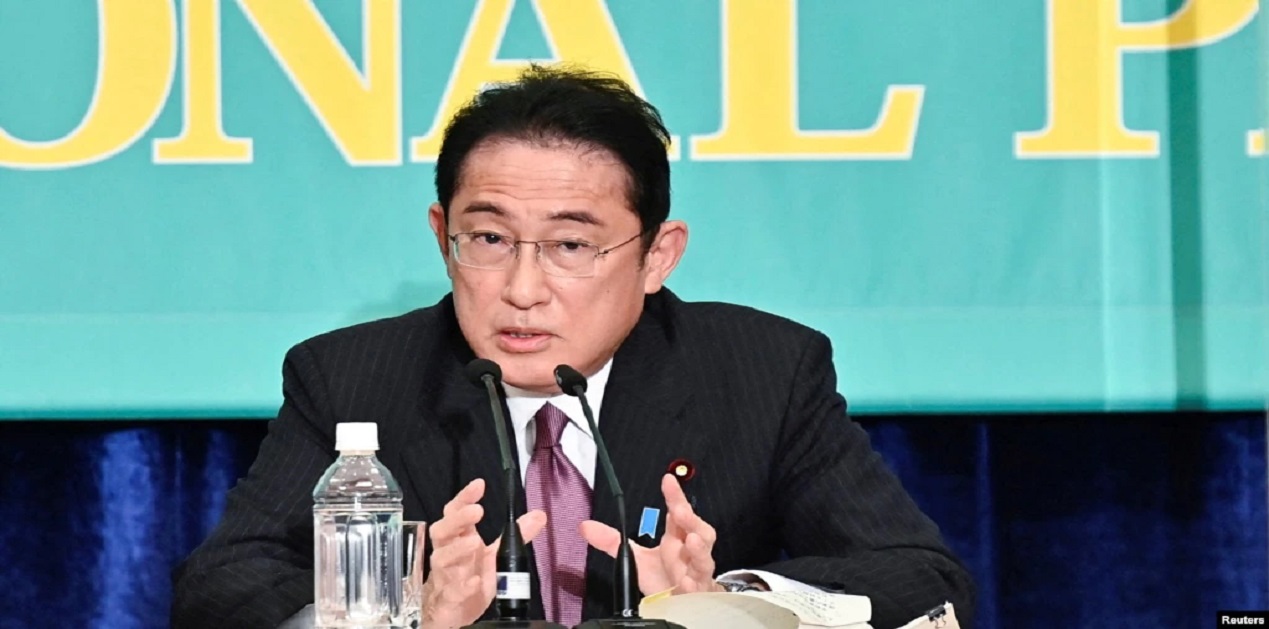With less than a year in office, Japan’s Prime Minister Fumio Kishida now confronts domestic political challenge when the country’s Upper House goes to the polls on 10 July in which his ruling coalition government expects to get a majority, which shall help Kishida to implement some of his long cherished goals as law-making shall be a smooth affair. According to an Asahi Shimbun survey, the ruling coalition expects to gain some seats from the opposition Nippon Ishin (Japan Innovation Party). In a house of 247 members, 125 seats shall be open to contest and the LDP-Komeito coalition hopes to win close to 63 seats as the opposition is fragmented and there is no electoral cooperation among the opposition camp. The main opposition Constitutional Democratic Party (CDP) is likely to lose some of its present 23 seats.
Upper House elections are held once every three years, with half of the seats contested in an election. Of the 125 seats going to elect new members, there is a by-election in Kanagawa Prefecture. Unlike the Upper House elections in 2016 and 2019 when the opposition fared relatively well, this time the lack of cooperation in the opposition camp shall favour the ruling coalition whose combined number could swell towards a majority.[1]
Another opinion poll conducted by the Kyodo news also saw the ruling bloc securing majority in the July Upper House race. Kyodo survey projected the LDP and its junior partner Komeito to win more than 63 seats. If this comes true, Kishida and his coalition partner shall get a majority in the Upper House. Since half of the 248 seats remained uncontested, the target requires the coalition partners to win a total of 56 seats to get a majority. The Opposition parties’ gain shall remain limited as the group failed to field unified candidates.
In view of the severe security environment in Japan’s neighbourhood, security issues have remained in focus for quite some time. The former Prime Minister Abe Shinzo, known for his nationalistic views, tried his best to amend Article 9 of the Constitution that prevents Japan’s aspiration to be a normal country but failed. By reinterpreting the peace clause, he partially achieved his objective by enacting the principle of collective self-defence.[2] But this is not enough and this has remained a burning issue amongst his successors, first by Yoshihide Suga government and now by Kishida.
Now with the possibility of the pro-constitutional revision camp, including Kishida’s LDP and some small opposition parties getting a two-third majority in the 248-member House, the process of initiating an amendment could move a step further.[3] That would overcome the limitations imposed under Article 96. Yet, there are more hurdles ahead as the issue of national referendum would be a tough call. The LDP leads the pro-constitutional revision forces, which includes Komeito, the Japan Innovation Party and the Democratic Party for the People. Since its promulgation in 1946, the Constitution has never been amended and the status of the Self-Defense Forces (SDF) does not lend itself to be called a full-fledged military. In view of Japan’s vulnerability stemming from visible external threats lurking at its door, Japan still lacks the legal power to use force to defend its interests and has to depend on external support, particularly from the US. Despite this, Japan’s efforts to undo this limitation have not yielded the desired results. Besides the alliance relationship with the US, Japan has strengthened security cooperation with India and Australia.
The Asahi Shimbun survey said that 68 per cent of candidates favour bolstering Japan’s defence. This was nearly double the 37 per cent of three years ago, reflecting fears about Russia’s military operations in Ukraine. The survey team was led by Masaki Taniguchi, professor of political science at the University of Tokyo.[4] Candidates were given five choices to questions about strengthening defence and revising the Constitution: favour, somewhat favour, neither, somewhat oppose and oppose. A record of 99 per cent were in favour or somewhat in favour of strengthening defence, which was even higher than the 95 per cent in 2013 Upper House elections held under then Prime Minister Abe. Even the junior coalition partner Komeito known for its pacifist policy showed 83 per cent endorsement this time up from its 13 per cent three years ago.
Even the Opposition was on board. It is possible that the deteriorating security environment in Japan’s neighbourhood influenced the judgment of the opposition, which felt that Japan’s defence capability needs to be beefed up. The CDP’s endorsement to strengthen the nation’s defence was reflected in the 31 per cent support this time from its 2 per cent three years ago.
Other opposition parties, barring the Japanese Communist Party and Social Democratic Party, mostly endorsed government’s resolve to initiate the amendment process. Only 85 per cent of Reiwa Shinsengumi candidates were opposed.
What does this trend indicate in Japan’s thinking for its security? There is no denying the fact that Russia’s aggression against Ukraine made Japanese worry about their nation’s security. The issue that deserves intense scrutiny is if Japanese anxiety to push for a rapid military build-up to secure peace and security can make any headway.[5] The onus lies on the lawmakers to map out a comprehensive security and foreign policy strategy that will work and be result-oriented. Since the Ukraine war, public opinion as revealed from various opinion surveys show that the Japanese people shall endorse a more robust security response from Japan in which bolstering the nation’s security shall form a vital part. Does it mean that the national referendum is given? The answer is NO as the issue is complicated.
As mentioned, the preferred option for major political parties in Japan seems to be to support the basic principles of the Japan-US alliance and expand cooperation with like-minded Asian and European countries and beef up the necessary defence capabilities. This does not mean that there are no major disagreements on how to enhance deterrence. The most testing issue for the ruling LDP is that there could be no consensus among major opposition parties to its resolve to significantly ramp up the country’s defence budget within five years, to 2 per cent or more of the country’s GDP. This is a target adopted by the NATO as a benchmark to which Kishida has committed. In the campaign trail, Kishida’s LDP pledged to ensure that Japan will “possess” the capability of striking enemy bases, now rewarded as a “counter-strike capability” that would cover not just missile bases in enemy territory but also command function facilities. If Kishida succeeds to raise the country’s defence budget to beyond 1 per cent and up to 2 per cent and beyond, that would make Japan the third largest military power after the US and China. That would radically change Japan’s international image as a peace-loving nation.
Another significant issue that emerged from the survey is that the ruling LDP candidates in the race for the Upper House were least supportive of the rights of sexual minorities and legally allowing married couples to use different surnames. The survey revealed that as against just 40 per cent of LDP candidates in the July 10 election supporting promulgating such legislation, 96 per cent of the main opposition Constitutional Democratic Party, 70 per cent of Komeito (junior partner of the ruling coalition), 93 per cent of the Nippon Ishin, 100 per cent of the Japan Communist Party, 82 per cent of the Democratic Party for the People, 100 per cent of Reiwa, 91 per cent of the Social Democratic Party, and 52 per cent of the NHK Party pledged to support such a legislation.[6]
Another significant highlight of the 10 July Upper House election is that 33 per cent of candidates are women, the highest ever. A record of 181 of the 545 people standing for election on 10 July is women.[7] This is an increase from 77 female candidates contested in the 2019 upper house election. The Fifth Basic Plan for Gender Equality formulated in 2020 called for increasing the percentage of female candidates in the upper house election to 35 per cent by 2025, the next election term. In order to comply with this target, a quota system mandating each party to have a certain percentage of women as candidates would be required.
The most conspicuous miss in the election campaign trail is that the country’s perilously low birth rate became a forgotten issue. While the geopolitical and economic concerns dominated the headlines, the critical issue of declining birth rate was almost overlooked. This demographic issue should have a priority agenda for most political parties but regrettably it was blissfully kept in the background.[8] In view of the looming crisis in the future as the birth rate continues to fall and longevity increases, several measures such as investment in child care and other incentives are urgently needed that all political parties at the helm are needed to address. Though reversing the low fertility rate is a complex issue as several societal factors are involved, a determined response from the political leaders is the need of the hour; else the nation’s future would be at peril.
Endnotes :
[1] “Survey: Coalition to win majority of Upper House seats contested”, The Asahi Shimbun, 24 June 2022, https://www.asahi.com/ajw/articles/14652769
[2]See, Rajaram Panda, “Debate on Collective Self-Defence and Constitutional Revision in Japan”, Reitaku Journal of Interdisciplinary Studies, vol. 26, 2018, pp. 1-19.
https://reitaku.repo.nii.ac.jp/index.php?action=pages_view_main&active_action=repository_view_main_item_snippet&index_id=476&pn=1&count=20&order=17&lang=japanese&page_id=13&block_id=29
[3] “Japan ruling bloc to secure majority in July upper house race: poll”, Kyodo News, 24 June 2022, https://english.kyodonews.net/news/2022/06/173821f88d76-japan-ruling-bloc-to-secure-majority-in-july-upper-house-race-poll.html; https://www.japantimes.co.jp/news/2022/06/24/national/politics-diplomacy/upper-house-election-constitution-revision/
[4] “Survey: 68% of candidates favor bolstering Japan’s defense”, The Asahi Shimbun, 24 June 2022, https://www.asahi.com/ajw/articles/14652834
[5] “Security Strategy need not rely on military power alone”, The Asahi Shimbun, editorial, 24 June 2022, https://www.asahi.com/ajw/articles/14652484
[6] Yuta Ogi, “Survey: LDP lags far behind other parties on gender diversity issues”, Asahi Shimbun, 26 June 2022, https://www.asahi.com/ajw/articles/14654161
[7] “33% of candidates in Japan’s upper house election are women, highest ever”, Mainichi Daily News, 23 June 2022, https://mainichi.jp/english/articles/20220623/p2a/00m/0na/010000c
[8] “Japan's perilously low birthrate a forgotten election issue”, Mainichi Daily News, 4 July 2022,
https://mainichi.jp/english/articles/20220702/p2g/00m/0na/045000c
(The paper is the author’s individual scholastic articulation. The author certifies that the article/paper is original in content, unpublished and it has not been submitted for publication/web upload elsewhere, and that the facts and figures quoted are duly referenced, as needed, and are believed to be correct). (The paper does not necessarily represent the organisational stance... More >>
Image Source: https://gdb.voanews.com/10050000-0aff-0242-747e-08da537538d8_w1023_r1_s.jpg










Post new comment